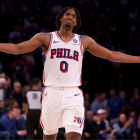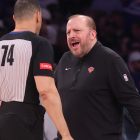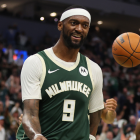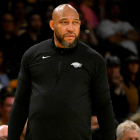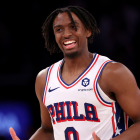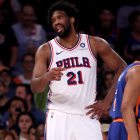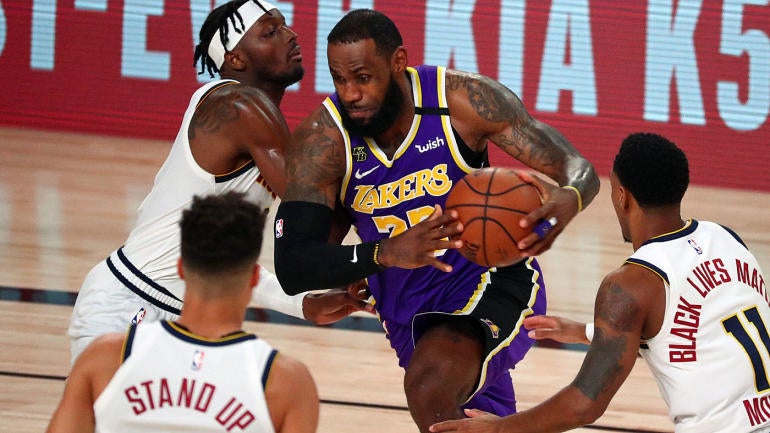
LeBron James' place in the NBA was virtually unchallenged for, at the very least, most of the past decade. Challengers came and went. Some of them even teamed up to oppose him. But even as his championship momentum gave way to the Golden State dynasty, few would argue during his stints with the Miami Heat and Cleveland Cavaliers that any player was better than LeBron, even if they happened to play for better teams. And then he became a Laker.
Year One in Los Angeles was a disaster. At best, LeBron looked old. At worst, his looked disinterested. His roster crumbled around him. His team president quit. He suffered the first significant injury of his career. And even after Anthony Davis hopped aboard, the 2018-19 campaign left such a bad taste in the mouths of fans that, finally, his perch atop the mountaintop was in question. The notion of a washed-up king appeared closer and closer to reality.
The arguments ranged from reasonable to ridiculous, but there were several. Over the course of the season, LeBron dispelled most of them.
- Could he still stay healthy? Yes, and he hardly had to load-manage to do it. James missed only four games during the season.
- Could he lead an offense without a star guard to carry the day-to-day burden? James led the NBA in assists, and the pre-bubble Lakers ranked fourth in offense.
- Could he turn back the clock and play consistent defense? LeBron received several All-Defense votes. His work on Jamal Murray won the Lakers Game 4 of the Western Conference finals.
Only one flaw remained, but it was a biggie. Perimeter players tend not to make it to 35 with their stardom intact. Michael Jordan played his final season at that age. Kobe Bryant was rehabbing a torn Achilles that he would never truly recover from. Even if James was the better player, Kevin Durant undeniably outdueled him in the clutch portions of the 2017 and 2018 NBA Finals. Kawhi Leonard took that mantle for himself in 2019. Asking LeBron to remain an All-Star at 35 was one thing. Asking him to guide a team through the postseason gauntlet, where the league's best players are truly judged, was quite another. LeBron has been excellent overall this postseason, but there has been apparent slippage in a key age-related area: endurance.
James topped 40 minutes only once in the first 14 Lakers playoff games. He'd done it 177 times in the past, but extra rest proved necessary. James' scoring numbers fell off a cliff late in games this postseason. Prior to Saturday, he shot only 1 for 9 in NBA-defined clutch situations during the playoffs. Exclude Game 4 of the Denver series, in which he racked up several easy buckets off steals in transition, and he shot 37.5 percent in the fourth quarters of the 14 Lakers playoff games. Some of that was on his team. Limited spacing made the Lakers a somewhat mediocre half-court offense. But the playoff problems looked age-related. James consistently managed to find the right matchup through aggressive pick-and-roll switch hunting ... but would then dribble aimlessly before settling for a jumper.
Players attack the basket when they're fresh. They settle for jumpers when they're tired. Those jumpers miss short when they're exhausted.
James is an inconsistent jump shooter in the best of times. This postseason he's been mired in one of the worst funks of his career, shooting 34.5 percent on mid-range looks and 4 of 14 on his open or wide-open 3-pointers in the first four games of the Western Conference finals. LeBron looked like LeBron in first halves, driving to the basket and finishing in traffic, but in the second he looked like a 35-year-old. And then, Game 5 rolled around.
The Lakers entered the fourth quarter leading the Nuggets by three, but having blown a 16-point third-quarter lead. Blowing leads against the Nuggets is ill-advised. Just ask the Clippers, who led their series 3-1 and held double-digit leads in each of the final three games of the series, but were still eliminated. The Lakers were reeling. Someone had to take control of the game.
That someone was LeBron. James scored 16 points in the fourth to seal the victory and the Western Conference championship, and he did it by combining his trademark aggression with the legendary basketball IQ that will stay with him for the rest of his career.
The barrage started with James seeking out his preferred matchup in pick-and-roll. When he couldn't find it, he barreled into the lane and tossed up a floater with two defenders trailing him, another in front and Dwight Howard impeding his airspace.
This is the compromise LeBron tried to strike at the end of Game 5. He knew the Nuggets would have a wall waiting for him at the basket, but settling for long field goal attempts was hardly acceptable either. So he probed and found the shots he could near the rim. With Jerami Grant on him and Nikola Jokic at the hoop, a layup was off the table, so LeBron steered Grant into Jokic as if to use Denver's own defender as a screener for him. It bought him just enough space to get off this fall-away from the left block.
With just over three minutes left, James turned to that close-range fall-away jumper again. This time, he managed to get his preferred matchup, the injured and tiny Jamal Murray, but with two more defenders near the basket, he spun around and softly pushed the ball through the net.
But LeBron being LeBron still sought out the best possible play for his team rather than himself. With the Nuggets playing him as a driver, he took advantage. On one play, the Lakers set up a double-drag pick-and-roll with a bit of screen-the-screener action to confuse the Nuggets. It worked. Both Grant and Jokic played LeBron for the drive, setting up Danny Green for the wide-open 3.
And, yes, on occasion, there was nothing special going on. LeBron just made his shots, like this one he nailed right in Grant's face.
These are superstar shots. They are the sort of daggers that the NBA's best players need to be able to make deep into the playoffs, when opponents have taken away their favorite looks. Giannis Antetokounmpo hasn't found these kinds of counters yet. He's out as a result. Leonard has them in his arsenal, but this same Nuggets team solved them a round ago. But LeBron buried them.
When the Lakers needed a superstar to steer their offense for one more quarter to reach the Finals, LeBron did it, and after watching him struggle through the wrong kinds of shots for four consecutive fourth quarters, the Nuggets finally had to acknowledge what was happening by the end of this one. So broken were they by LeBron's 16 points that, with under two minutes left, they grew fed up and started giving him the James Harden treatment: doubles behind the 3-point arc without a screener.
That was the crowning moment, the one in which the defense acknowledges that the superstar's game is so complete that they have no other option but to force the ball out of his hands. It is the moment that James has spent the entire season building toward, the point he'd proven time and time again but needed to reiterate in light of his age and 2019 postseason sabbatical.
There are no more qualifiers. LeBron James isn't just "great for 35" anymore. He hasn't meaningfully declined. LeBron James is still very much LeBron James, no "ifs," "ands" or "buts," and if the past decade of NBA history has taught us anything, it's that nobody in the league is better than he is. We just needed to know for certain that this version of LeBron was in there. Now we know, and the Lakers enter the Finals with the league's undisputed king securely back on his throne.














